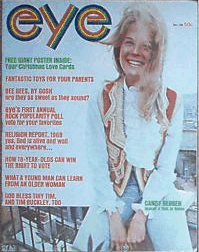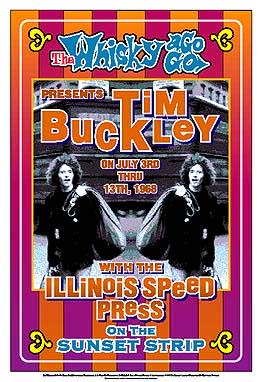1968
This
article appeared in the December 1968 issue of Eye
magazine,which was published by the Hearst Corporation under
the supervision of Cosmopolitan's Helen Gurley Brown.
And
God Bless Tim Buckley Too...
by
Jerry Hopkins
He
looks like a raggedy kid, so leaf-like and thin
you want to take him out and buy him a good meal. But his voice is haunted, haunting,
and his songs are like poems, dreams, stories, hallucinations. The searing Santa
Ana winds are blowing in Los Angeles, and southern California is simmering in
mid-summer heat. The thing to do is maintain, make life as comfortable as you
can for yourself, and let someone else take care of you.
 |
|
Eye
was a music-oriented magazine that covered pop culture,
sports and fashion.
There were only 15 issues published between March 1968
and May 1969,
most with a bonus item inserted for the reader - posters,
record, comic book.
(Many
thanks to Sal Caputo for the correct attribution.)
|
Tim
Buckley is doing this in Sandy Koufax's Tropicana Motor Hotel, a sprawling complex
of asphalt parking slots and characterless eleven-dollar-a-day cubicles frequented
by musicians with hair. His home in Topanga Canyon is more comfortable, but he
had to get his car to the garage, and it's a drag to drive twenty-five miles from
that country hideaway into a smoggy city at 8 A.M. after singing at the Whiskey
a Go-Go until two. So Buckley moved his grin and his girlfriend and his twelve-string
Gibson into the motel for a day.
A
few miles to the north and east, in another section of Hollywood, a telephone
rings. "Hi," says Jainie Goldstein, "this is Tim Buckley's old
lady. We're at the Tropicana now." I say I'll be there in half an hour. Jainie
is the tough little lady Buckley wrote most of those songs about in his first
album, the one that carried his name as a title. He is free, white and twenty-one
and he has been roaming the country for five of those years, but Jainie makes
the calls and takes care of him. She is small, wiry, and looks more mature than
her twenty-one years. You've
got the untortured mind of a woman
he sang in 'Song for Jainie'
Who
has answered all the questions before
You've got the free-givin' ways of a
woman
Who has kicked all the heartache out the door
With
Jainie and only three or four close friends, Buckley is in
a strange limbo-land, that peculiar level of identity inhabited
by the "almost-star." He is
a star, of course, first-billed wherever he plays and earning
a star's salary
(between $2,500 and $5,000 a week--when he works). But he
is not, as they say in The Biz, ready for his own television
special yet. He hasn't had a smash record and although such
divergent groups as Hedge and Donna, and Blood, Sweat and
Tears have recorded some of his songs, no one has gone zipping
up the Billboard and Cash Box charts with one of the to give
Buckley even a secondhand hit (like Tim Hardin with If
I Were a Carpenter). And there is an unfortunate tendency
to lump Buckley with other personalities in today's "hip"
musical limelight, with the Tim Hardins and the David Blues
and the Joni Mitchells and the Leonard Cohens.
No--Tim
Buckley is on a different trip. Like Alice in Wonderland, he has stumbled into
a special rabbit hole of his own that no one else has found. And forget the thing
about success. "It's even weird talking about it," he once said. "Timmie
really is like a symbol of that generation he is in,"
says David Anderle, director of the West Coast office of Elektra records. "Timmie
is not a teacher or a prophet or a spokesman like Dylan. Timmie is a mirror of
the times. He is very close to being a painter. People like Timmie should be supported
without any conscious concern of making a return on the investment. He's chronicling
a generation of kids and their hangups." The Troubadour's Doug Weston, one
of the first club owners to hire him, adds: "He speaks of the confusion of
a young person trying to love. He says that love is what makes life worthwhile."
O
I never asked to be your mountain
I never asked to fly
Remember when you
came to me
And told me of his lies
You didn't understand my love
You
don't know why I tried
And the rain was falling on that day
And damn the
reason why His
songs have been called poems, dreams, stories, hallucinations. His imagery is
scattered and sad and fresh, like the rain he so often sings about. The words
above are from I Never Asked to Be Your Mountain. From a song called Hallucinations,
here is more Buckley rain: I
found a letter
On the day it rained
When I tore it open
There in my hands
Only
ash remained He
sings this song-cycle of love and life in a haunted, and haunting, voice, a countertenor
that rises and slides. A year ago his voice was one of the factors slowing his
career. Critics called it shrill, or walked out in the middle of a performance.
"He had a tendency to be a little mealy-mouthed," said Doug Weston.
"His diction wasn't what it should have been initially. He's changed now,
but the quality and texture remain -- the plea, the cry, the pain." His voice
is a blade of grass that bends in many ways, however variant, full of purity.
The
way this purity shows itself in performance can be unnerving. Buckley is sensitive,
totally aware of his environment at all times. Noises, the "wrong" temperature
or a restless audience can destroy him and the set will be extremely brief. But
if everything is right, he will stand in those worn wide-wale corduroys and loose
tan shirt, a wire-thin frame seeming barely able to support the huge guitar, and
sing for at least twice as long as expected. His dark eyes will narrow, and he
will weave and writhe sensually, as if possessed by his intricate melodies. He
is, in these intimate moments, precisely where he wants to be, as he says in Good-bye
and Hello I
am young
I will live
I am strong
I can give
You the strange
Seed
of day
Feel the change
Know the Way Sitting
in that small motel room on that searing California afternoon,
he talked of his early life. I wanted stories and facts and Buckley happily provided
them. He was born in Washington, D.C., lived in upstate New York, he said, and
moved when he was nine to Bell Gardens, California,

The
Whiskey A Go-Go gig referred to in this article is likely
this one; July 3-13 1968 |
settling
into a time and place that was flanked by hot rods and conservative politics and
sticky with processed pompadours. At fifteen he was a varsity quarterback, weighing
in at a less-than-impressive one hundred ten pounds. He went out for baseball
(and made the team), taught himself how to play the banjo and guitar, and baby-sat
for people who worked at nearby Disneyland. Buckley was, in Arlo Guthrie's words,
"the all-American kid." "But
I also played at car club dances with all those early Louie, Louie bands,"
he said. "You know -- carburetor soul. And getting arrested. Oh, there was
a lot of that. I hung out with the Downey Gents and the Mondo Car Club in El Monte.
I didn't have a car, so I'd go with the other guys, who were always getting busted
for rumbles and maybe stealing things." The
end of his sophomore year he decided not to play football anymore. At the same
time, he found himself becoming a troubadour. He'd been gigging occasionally with
country and western bands when they came to town, groups like Princess Ramona
and the Cherokee Riders (he says), and they'd told him stories about where they'd
played. That started him jockeying for top position on the truant officer's most-wanted
list. "They
traveled the beer-bar circuit," he said of his friends. "Oklahoma, Arkansas,
Texas, Arizona... and it sounded good, so I started traveling, too. I got busted
once or twice in Arizona and sent back home. The school got hip to me and I couldn't
even stay home when I was sick. They figured I was out with my guitar again. So
I got inventive and told them my grandmother died in New York or something. My
grandmother died several times that year. "I
really dug the people in those small towns. In Georgia they'd put you up and feed
you if you played. These people never see anybody, they never meet any performers.
I wasn't sensational. I was just doing a thing. Blues. Country. But they appreciated
it. Some day I'm gonna cut my hair and go back." (It
was during these early ramblings that he found and shed a wife. "They're
divorced now," says Herb Cohen, his manager. "It's no bad scene, but
why bring up those things -- ex-old ladies and so on. It was a long, long time
ago." Buckley still sees his ex-wife and their small son when he visits friends
in Orange County.)
During
one of his periodic visits home to Bell Gardens he ran into
a drummer named Jimmy Carl Black. They had taught music after
school in the same Santa Ana music shop and now Black was
drumming with the Mothers of Invention. He suggested Buckley
meet their manager, Herb Cohen. They met, Cohen got Buckley's
hastily formed group an audition at a local club, and Buckley
agreed to sign with him.
|